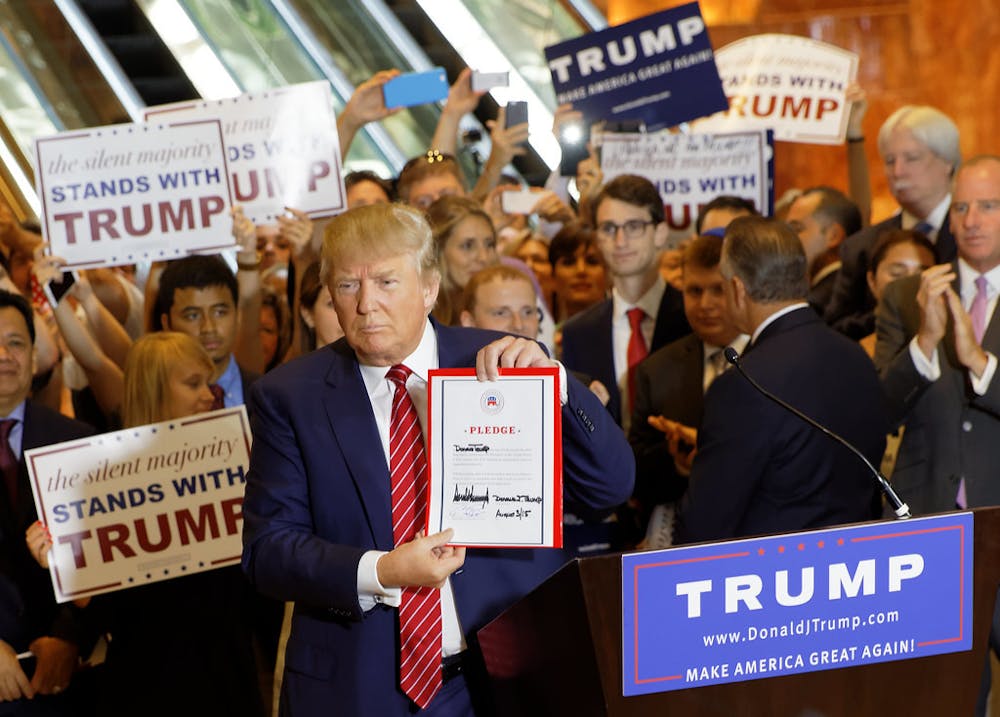On Tuesday, Nov. 11, the Hopkins Political Union (HPU) hosted an open-forum debate on the future of the Democratic and Republican parties. The organization, formed in 2024 in collaboration with the Stavros Niarchos Foundation (SNF) Agora Institute and the Heterodox Academy, aims to promote thoughtful political dialogue among students.
Aneesh Swaminathan, the president of HPU and the College Republicans, began the event with remarks about the importance of building a campus community where diverse perspectives are welcome. Next, moderator Dylan Faulkner Selterman, an associate teaching professor in the Department of Psychological and Brain Sciences, and Mary Bruce, the assistant director of public programming at the SNF Agora Institute, described the structure of the event and encouraged attendees to participate respectfully. Bruce then asked the audience what it means to have a good debate. One student responded.
“Being open to new information, even if it contradicts your own beliefs, absolutely,” they said.
The debate was structured around two resolutions. The first concerned whether democratic socialism is the future of the Democratic Party. Two members on opposing sides of the resolution gave speeches framing the major factors involved, starting with Swaminathan.
“Mamdani proves that democratic socialist ideas aren't just slogans – they're winnable and workable. He had the highest election turnout since 1969,” he said.
Another member of the club then gave an alternative viewpoint, claiming that democratic socialism is not the future of the party.
“The [Democratic] Party should stop treating ideas such as democratic socialism as a dirty word and allow candidates to best represent their constituency in order to expand the Big Ten coalition, which empowers the party and better integrate the youth progressives into the party,” he said.
The discussion was then extended to include the audience, who took turns sharing their opinions with a two-minute limit. Students expressed concerns about the rising tide of populism. Others focused on whether voters in metropolitan areas like New York City can represent national Democrats. However, some communicated hope about the benefits of expanded social programs.
The second contention regarded whether MAGA Republicans are here to stay, referring to the camp of pro-Trump Republicans and the vitality of their policy base. This contention was introduced first by junior Timothy Allen.
“When the right conditions are met, the vaguely defined populist movement that Trump created will in fact, be quite easy to adapt for his successors,” he said. “While it may seem at this moment that Trump dominates the Republican Party such that nobody can replace him, the movement to conservatism underpinned by a set of policy principles – isolationism, fiscal conservatism and Christian nationalism – brought together through a terribly flexible populism.”
Swaminathan followed up with his own introduction.
“I'm skeptical because I believe there is a great threat, in my humble opinion, to the [Make America Great Again (MAGA)] movement and socially conservative moral vision that comes from the alt-right,” he said. “An open question, I believe, remains: will the movement's tenacity prove sufficient to hold this coalition together, and, more importantly, to build upon it towards a coherent governing vision that outclassed its founding personality?”
The floor was opened once again for comments from attendees. Some expressed the difficulty of maintaining a movement with such a wide-ranging set of policy ideas, noting the recent fracturing of relations among right-wing public figures such as Ben Shapiro and Tucker Carlson following the death of political activist Charlie Kirk. Others commented on the recent blue wave in November elections and the potential receding support for MAGA Republicans from centrist voters.
During this part of the discussion, issues regarding whether alt-right groups should feel represented by the MAGA Republicans became central to the debate. Some students were adamant that over half of voters in the 2024 presidential election could not have supported white nationalism. Other students cited controversial immigration policy and support from alt-right groups as proof of a permanent shift in Republican ideology.
In an interview with the News-Letter, Selterman explained the inspiration for the event.
“Research has shown that one of the big reasons for political polarization in America is pluralistic ignorance, which is to say that people misunderstand each other by overestimating disagreement,” he wrote. “HPU provides a common space for students to thoughtfully listen and engage constructively.”
Selterman also commented on the discourse of the event itself. “In the event, students spoke about their concerns, their predictions, and critiques of mainstream political movements,” he wrote. “They also spoke to each other by challenging each other's viewpoints.”
In an interview with The News-Letter, sophomore Rania Dey Meyer commented on what motivated her to attend the event.
“I did think there were pretty diverse opinions,” she said. “The discussions got off topic very quickly, and a lot of people were debating not about whether democratic socialism is the future of the party but whether or not it’s good.”
The HPU will continue to hosts debates of this nature throughout the year, focused on timely issues and the political concerns of Hopkins students.





